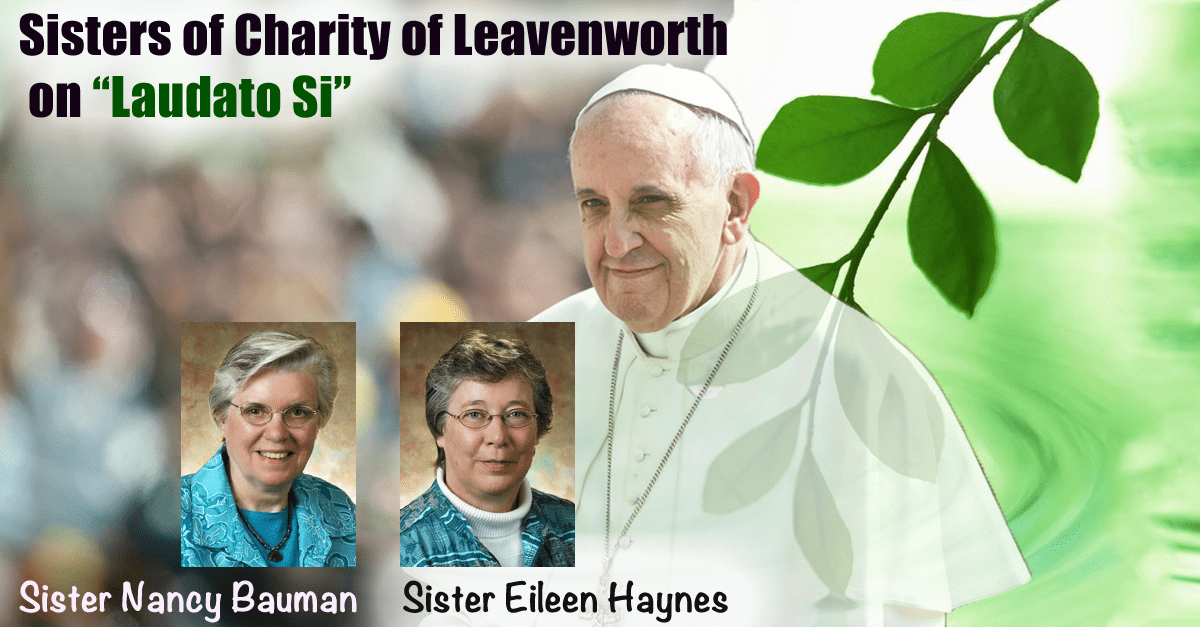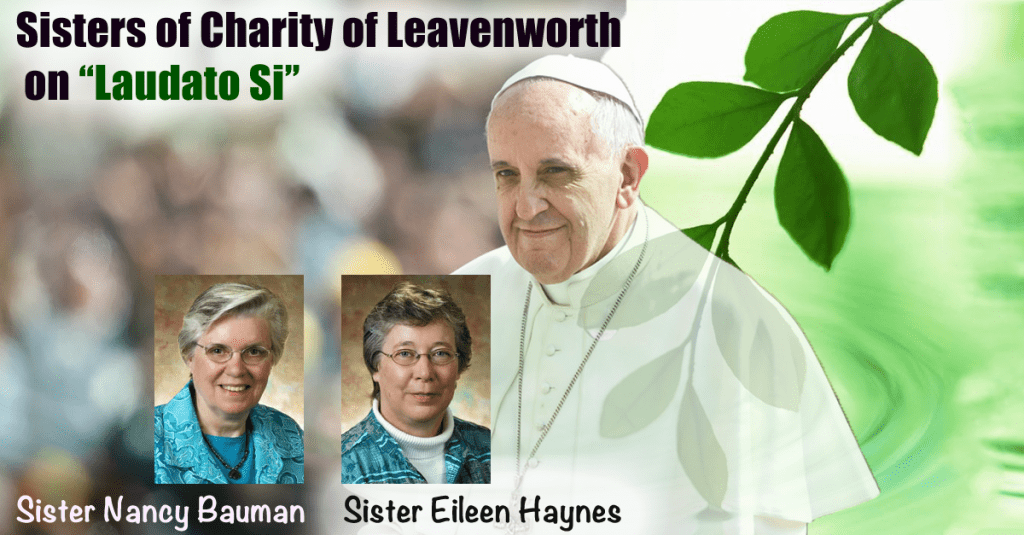Sisters of Charity of Leavenworth on “Laudato Si”
 The Sisters of Charity of Leavenworth have spoken out on Laudato Si. In a July 2 article that just came to our attention, the Leavenworth Diocesan paper ran an article “Local Catholics weigh in on ‘Laudato Sí’”
The Sisters of Charity of Leavenworth have spoken out on Laudato Si. In a July 2 article that just came to our attention, the Leavenworth Diocesan paper ran an article “Local Catholics weigh in on ‘Laudato Sí’”
Jessica Langdon (jessica.langdon@theleaven.org) wrote “When everything is connected, any action is bound to create a ripple effect.”
Sister Eileen Haynes, SCL, tries to make sure every ripple she causes is a positive one.
It’s part of realizing that everything she does somehow has an impact on others in the world, even if she will never know them.
“It’s all interrelated,” she said, and God is at the center.
“Then I understand that I can no longer justify buying chocolate that’s not fair trade,” she added. “Or coffee.”
It affects where she buys food and even how much she eats.
“We have that moral responsibility for all life, whether it’s two-legged, four-legged, six legs or eight,” she said.
Sister Eileen and Sister Nancy Bauman, SCL, both serve on the Sisters of Charity of Leavenworth’s leadership council.
Both have a passion for the sustainability of creation, which they bring to the community’s Care of Creation Committee.
Long active in social justice, the entire SCL community made care of creation a major priority during at least the past two chapter meetings, in which they mapped out the direction and related actions for the six years ahead.
And with environmental concerns so ingrained in what they already do, they and many others were excited to delve into Pope Francis’ encyclical “Laudato Si’, on Care for Our Common Home,” released on June 18.
Exciting release
“I’ve never seen or heard of an encyclical before that’s had so much anticipation,” said Sister Nancy. “It’s very exciting for me to have our pope say this to, in fact, all people, not just Catholics, but to all people.”
Their community has been working on many measures for years, but know there’s much more everyone can do.
They’ve designed the new Ross Hall skilled nursing facility on the motherhouse campus in Leavenworth with the environment in mind; they work to oppose the Keystone Pipeline; and they provide safe, clean drinking water to people in Peru, South Sudan and a Native American reservation in Montana through an SCL water filtration project. And those are just a few examples.
Bill Scholl, consultant for the archdiocesan office for social justice, encourages every Catholic to read the encyclical completely and to prayerfully reflect on the pope’s messages in it.
“This encyclical really is a game-changer, and every American Catholic who reads it will probably be challenged to step out of his partisan comfort level,” said Scholl. “Secondly, be prepared to reflect and make changes to your lifestyle and the way your organizations do business. As Pope Francis notes, ‘Every effort to protect and improve our world entails profound changes in “lifestyles, models of production and consumption, and the established structures of power which today govern societies.” Authentic human development has a moral character.’”
‘What kind of world do we want to leave?’
Scholl believes one of the most significant points Pope Francis makes in the letter is the call for an integral ecology, “the realization that we are created by God from nature and hence are called to cooperate with God’s design in our relationship with the natural world and in our relationships with one another.”
“The damage mankind is doing to the natural environment and the social environment are intimately linked,” he continued.
“In his stirring and demanding new encyclical letter Laudato Si’, Pope Francis challenges all of us, believers and nonbelievers, with one simple question: ‘What kind of world do we want to leave those who come after us, to children who are now growing up?’” said Msgr. Stuart Swetland, president of Donnelly College in Kansas City, Kansas, in a quote he penned with Rabbi Moti Rieber, director of Kansas Interfaith Power & Light.
IPL is a statewide, faith-based organization that focuses on the environment.
“Pope Francis, following in the footsteps of his namesake St. Francis of Assisi, refers to Mother Earth as ‘our Sister,’” they continued. “If this is so, we have not treated our sister very well.”
When it comes to the message of a “human ecology,” Msgr. Swetland and Rabbi Rieber describe the need for “a holistic approach that allows for an integral and genuine human development of all people.”
Care for creation, the poor
The Benedictine Sisters of Mount St. Scholastica in Atchison have also been heavily involved in environmental causes.
Sister Helen Mueting, OSB, is a co-chairwoman of a committee that has worked to address many of those issues within and outside of the community.
From recycling, composting and installing solar panels to using shampoos and other products without harmful ingredients, the Sisters have considered the environment from just about every perspective.
It’s about being stewards of creation, said Sister Helen, a point the Sisters make when they work with other groups — including area schools — on environmental issues.
“We also linked it to Benedictine values,” she said. “Stewardship is also an important value of St. Benedict.”
Pope Francis’ voice joins the voices of other popes, including Blessed Paul VI, St. Pope John Paul II and Pope Emeritus Benedict XVI in talking about these issues.
And as Pope Francis has pointed out, environmental issues have a particular impact on the world’s poor.
“To me, it’s a moral issue now, that if we don’t get concerned about the environment, we’re hurting our future generations, particularly the poor and poor countries,” said Sister Helen.
She’d like to see less consumerism and more reverence for nature.
If the damage continues, she sees the potential for increased inequity between rich and poor, as well as a greater risk of sickness and violence due to an increased number of refugees as weather worsens or water becomes scarcer.
Interconnectedness
Sister Eileen offered the example of inhabitants of an island having to flee to New Zealand from their home because the land — swallowed by water — no longer exists.
“Can you even fathom?” she said, contrasting the scenario with a disaster like a tornado in Kansas.
“You’ve still got the land that you can come back to,” she said. “They don’t.”
The “eco-refugee” also isn’t recognized by international conventions as a refugee, noted Scholl, so they shoulder the loss of the lives they had to leave with no legal protections.
“People in the less developed nations are more reliant upon nature directly for their sustenance and income, and so they feel the brunt of climate change more severely,” he added.
The impact is felt in a country someone is forced to leave, as well as in the place where they seek refuge.
“The dizzying pace of technological and societal change is referred to by Pope Francis as ‘rapidification,’” wrote Msgr. Swetland and Rabbi Rieber. “Compared with the ‘naturally slow pace of biological evolution,’ this transformation becomes problematic when it is not focused on ‘the common good or to integral and sustainable human development.’”
“As religious believers of different faiths, we share a common belief that the Earth has been entrusted to humankind as a gift to be cherished and protected,” said Msgr. Swetland. “As good stewards, we should hand on to future generations a world more ecologically and morally sound than the one we received. Pope Francis has presented us with the challenge; it is up to us to meet it.”








0 Comments